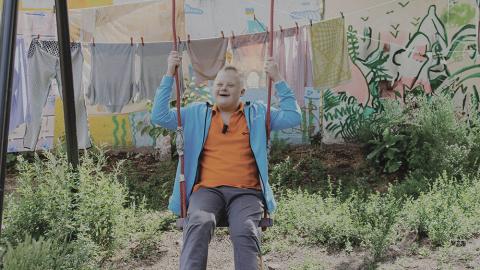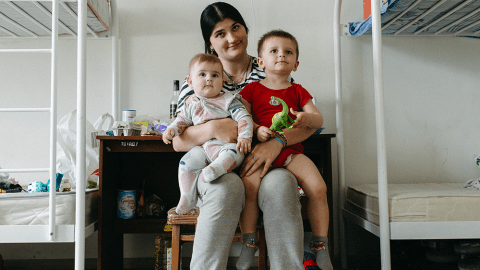Ukraine's children are faces of hope as war continues
Every Ukrainian child deserves peace and a bright future
Ukraine
Three years on, Ukraine's children continue to brace for enormous challenges
The ongoing war in Ukraine has deeply impacted the lives of millions. According to UNOCHA's 2025 Humanitarian Overview, approximately 12.7 million people still urgently need assistance, highlighting the ongoing humanitarian crisis in the region.
Humanitarian conditions have significantly deteriorated along the front line and at the northern border, impacting nearly 2 million children, 2.8 million internally displaced persons (IDPs), and 9.9 million non-displaced individuals, including returnees.
World Vision started working in Ukraine in March 2022 through six offices in Kyiv, Dnipro, Chernivtsi, Lviv, Mykolaiv and Kharkiv, as well as working to support Ukrainian refugees and host communities in Moldova, Romania and Georgia.
Over the past three years, WV UCR has expanded its reach across four countries, partnering with local and international organizations to serve those in need.
Since 2022 as of June 2025 World Vision Ukraine Crisis Response has reached over 2.245 million people, including more than 1,022 million children, with essential assistance – education, mental health services, cash assistance, livelihoods, winterization, and protection initiatives.
More than 1,350 million people (60% of total people reached by WVUCR ) were reached inside Ukraine across all 24 oblasts including internally displaces people, local communities and returnees, delivering emergency aid, supporting child protection and mental health through child-friendly spaces and psychosocial services, partnering with national and community-based organizations to strengthen local capacity etc.
World Vision has been operating in Romania for over 30 years, and we mobilised our response within the first weeks of the war. To date, our efforts have supported 346,178 refugees and host families (including 157,333 children), providing vital aid and assistance during this critical time.
Since beginning our work in Moldova in March 2022 in response to the Ukraine crisis, WV UCR has supported more than 510,323 people, including both refugees and host communities (with 215,854 of them being children).
Starting 1 July 2025, World Vision Romania established a branch office in Moldova and took on strategic leadership for future development programming in the country, under the coordination of its national office.
World Vision is one of the leading advocates on children’s rights in Georgia with over 20 years of work in the country. It has been providing assistance to 39,021 people who fled Ukraine, including 22,260 children.
Ukraine's children and families deserve better.
World Vision is responding to the needs of Ukrainian refugees and internally displaced, and host communities.
Three years of war: Ukrainian children need us more than ever
Over the past three years, World Vision has reached more than 2 million people, including nearly 1 million children, providing critical support. Despite these efforts, millions of children are still displaced, struggling to access the basic needs every child deserves, and deprived of their rights to safety, education, health and home.
Response Director Arman Grigoryan: “The ongoing war has left deep scars on Ukraine and its people, especially children, and while we have made progress, millions still need our urgent support to heal, rebuild, and secure their future – let's stand with them and continue to help."
We at World Vision continue to call on all sides to promote peace.
From the field
World Vision’s work in Eastern Europe
Our teams have been present in Eastern Europe for decades responding to natural disasters, conflict, refugee movements, economic hardships and the educational, physical and emotional needs of extremely vulnerable children.
Our response to the crisis in Ukraine began by assisting families fleeing to Romania, where we worked since 1990 following the fall of communism. In the past 30 years, World Vision Romania has supported more than 560,000 children from 500 rural communities. In the first month of the crisis, we have rapidly expanded to reach some of the most vulnerable families in Ukraine itself, as well as in Moldova.
Last year, we supported 3.2 million people across the Middle East and Eastern Europe with emergency response programmes and we have already reached almost 50,000 children and families for this crisis as well, with a focus on protecting the most vulnerable.
How does World Vision respond to emergencies?
World Vision teams have been responding to humanitarian needs for more than 70 years and we are present in 100 countries. When emergencies strike, local World Vision staff partner with global humanitarian specialists and churches in the disaster zone to respond at scale.
What is World Vision doing to help families impacted by this crisis?
World Vision is supporting refugees in Romania, Moldova and Georgia while helping the displaced families Ukraine.
We are engaging closely with the U.N. and other partners to closely monitor the unfolding crisis and its potential humanitarian demands.
We also support our offices across the region, including Georgia, where we're partnering with UNHCR to run shelters, and are helping Ukrainian children process their experiences and enrol in local schools. We know that the impacts of this crisis, from both a humanitarian and economic perspective, may have a significant ripple effect.
How can you help children and families impacted by this crisis?
Donate to help children and families forcibly displaced by the crisis in Ukraine.
Pray for peace to be restored quickly and that children and families will be protected from harm.
Advocate and add your voice to call for peace in Ukraine and protection for affected children and their families.
Related Stories
Press Releases
Related Resources
Frequently Asked Questions
What is the situation facing children?
We are deeply concerned about the impact of this crisis on vulnerable children and their families. We are witnessing significant forced displacement within Ukraine and to neighbouring countries. Additionally the economic impact of the crisis threatens to have a severe impact on oil and commodity prices, potentially deepening child poverty far beyond Eastern Europe. As always, children are the most affected by the conflicts.
What is World Vision's ability to reach the affected people?
World Vision is building a multi-country, multi-year response to meet the needs of people fleeing the conflict in Ukraine and those trapped or displaced within the country. We have been responding in Romania and Georgia from the very start of the crisis and have quickly expanded to reach the most affected families. In Ukraine, we have been supporting hospitals across the border from Romania who are trying to meet the needs of families displaced by the conflict, and are working with a range of faith and local organisations to put in place aid pipelines and logistics to support vulnerable and displaced populations further within Ukraine. In Moldova, the poorest country in Europe, and who has taken the largest number of refugees per capita, we’re supporting vulnerable families in both the host and refugee communities. We will continue to respond based on careful assessments of the fast-moving situation on the ground.
Is there a role for churches in Ukraine?
As a Christian organisation, we have decades of experience mobilising communities of faith to play their part in restoring peace and wellness, and we will seek to engage churches and faith groups to serve. We are partnering with faith groups and churches in Ukraine and Moldova to reach children and their families with essential aid. Our Romanian office has been working with faith leaders there for decades, and we will continue to work with all people of goodwill to save lives and livelihoods, help those who have lost homes and communities, and to protect the vulnerable.
Tragically, we live in a world of broken relationships where injustice, inequality, corruption, and disasters rob millions of their lives, their health and their futures. In World Vision, together with children and communities, we seek to uncover the deeper, often hidden, social, cultural and spiritual issues that prevent children from enjoying life in all its fullness.
What is World Vision doing to help families impacted by the crisis?
World Vision has been responding from the start of this conflict, providing hot drinks and liaison services at the border, equipping safe, warm spaces for children to play in processing centres and supporting shelters in Romania, Ukraine and Moldova to help children and families fleeing the conflict.
We are currently responding in Ukraine, Romania, Georgia and Moldova, and are partnering with local organisations to quickly scale up and reach the most vulnerable families fleeing the conflict. Our programmes are and will target the most vulnerable children and women with: non-food items and cash assistance; child protection and anti-trafficking programmes; mental and psychosocial support; and education.




